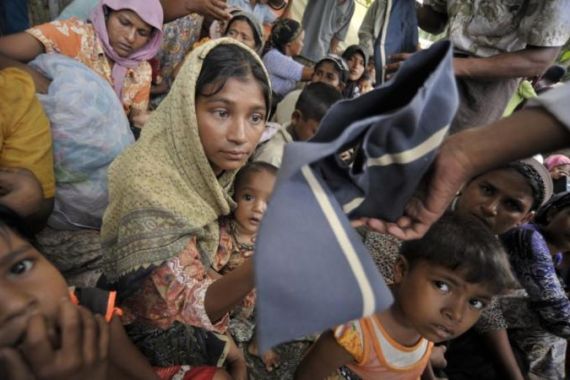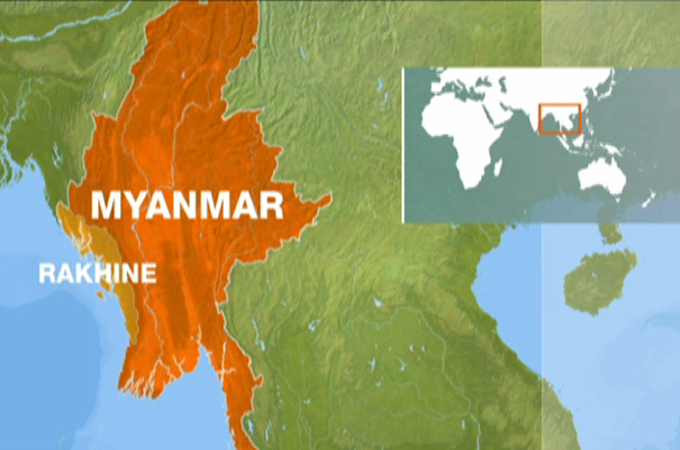Suu Kyi calls for more troops in west Myanmar
Nobel laureate urges more troops to be deployed to region convulsed by communal violence between Buddhists and Muslims.

Opposition leader Aung San Suu Kyi has urged the government to send more troops to western Myanmar to restore peace to a region convulsed by communal violence between Buddhists and Muslims.
The Nobel laureate, who has been criticised for failing specifically to condemn the treatment of Myanmar’s Rohingya Muslims, called on Thursday for an end to the unrest in Rakhine state that has left at least 180 people dead and 110,000 displaced since June.
“Everyone is responsible for respecting human rights, without discriminating between majority and minority, ethnicity and religion,” she said in a statement released with politicians from ethnic minority parties.
Suu Kyi said more security forces must be sent to bring “peace, stability and the rule of law” to Rakhine, where renewed conflict last month involving ethnic Rakhine and Muslims, mainly the Rohingya, killed scores.
The statement followed a meeting of the parliamentary committee on the Rule of Law and Stability, which Suu Kyi chairs.
It did not mention the Rohingya by name, and instead directly addressed the “concerns” of ethnic Rakhine.
‘Moral authority’
|
“[The Rohingya] continue to be ignored or demonised. its political unpopular to side with the Rohingya and I assume this is why they are not mentioned directly“ – Phil Robertson, HRW |
Responding to the statement, Phil Robertson, deputy director of the Asia division of Human Rights Watch, told Al Jazeera “peace and stability in the state wouldn’t come, unless root causes are also addressed and discriminatory actions and policies against the Rohingya are ended”.
“They continue to be ignored or demonised. its political unpopular to side with the Rohingya and I assume this is why they are not mentioned directly,” he said.
In rare comments touching on the topic, Suu Kyi said the government must “inform the public clearly how it will handle the citizenship issue”.
A 1982 law enshrines the citizenship of Myanmar’s officially-recognised ethnic groups but the Rohingya were excluded, despite their claims to have met the criteria by having ancestors in the country some 160 years before.
With about 800,000 stateless Rohingya in Rakhine, the reformist government is under international pressure to give them a legal status, with warnings that the conflict threatens its democratic transition.
Suu Kyi said that the issue in the Rakhine state, “is not the responsibility of a single country”, in comments likely to refer to Bangladesh.
She also acknolwedged the “very profound and sensitive” nature of the unrest.
Obama visit
Meanwhile, the White House confirmed that Barack Obama will visit the country on November 19.
 |
“In Burma, the President will meet with President Thein Sein and [opposition leader and human right activist] Aung San Suu Kyi and speak to civil society to encourage Burma’s ongoing democratic transition,” the White House said.
Obama’s trip would mark the first visit by a US president to the country.
Next week, Swedish Prime Minister Fredrik Reinfeldt
will also meet with Suu Kyi when he visits the country, his office said on Thursday.
Relations between Western countries and Myanmar have thawed significantly since Thein Sein took the helm of a quasi-civilian government last year and ushered in a period of sweeping reforms, including allowing Suu Kyi’s party into electoral politics.
The Rohingya are considered by the UN to be one of the most persecuted minorities on the planet.
Tens of thousands languish in squalid makeshift camps across Rakhine state after their homes were torched, while many others have tried to flee the region in rickety boats.
Bangladeshi rescuers on Thursday searched for 50 people missing after a boat carrying Rohingya heading for Malaysia capsized.